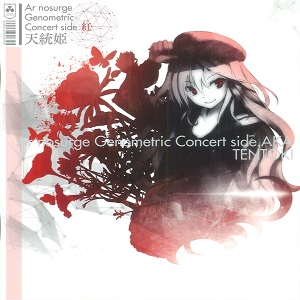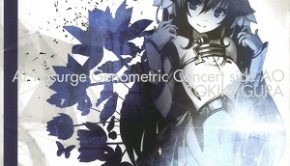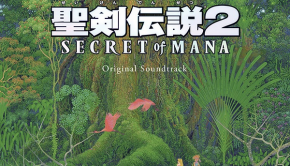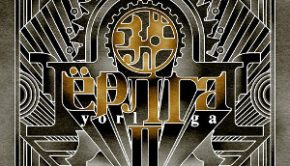Ar nosurge Genometric Concert Side Red -Tentouki-
 |
Album Title: Ar nosurge Genometric Concert Side Red –Tentouki- |
| Record Label: Gust |
|
| Catalog No.: GUSTCD-11013 |
|
| Release Date: March 05, 2014 |
|
| Purchase: Buy Used Copy |
Overview
Two years after Ciel nosurge was released and while its players were waiting for its two final chapters, Gust released its RPG sequel Ar nosurge: Ode to an Unborn Star. Unlike its predecessor, which divided its music in volumes according to the point in story in which it was heard, Ar nosurge employs for its music the same way of division that was used in the Ar tonelico games: an original soundtrack and two vocal albums. The album covered in this review is one of the vocal ones, which was composed by Hayano Asato, Morrigan, Kenji Kawai, and Haruka Shimotsuki, with Shimotsuki, Yoshino Nanjo, Lily and Noriko Mitose serving as the vocalists. However, does it still have the magic that the songs from the previous games in that universe had? Or is it lacking in comparison to them?
Body
First, I’ll give an introduction to the game setting: 5000 years have passed after the story of Ciel nosurge came to an end, in which the migration from Ra Ciela to a new planet ended in failure and thus the people were forced to board the Colony Ship Soreil and roam through space to find a new home to live in. All of the main characters put themselves into cryostasis to wait until the day they were necessary again, and have awakened to find the ship in chaos due to creatures called Sharl kidnapping the humans and taking them away to some unknown place. While most humans are defenseless against them due to their ability to use Song Magic, a few people called Weavers can use Song Magic themselves to defend against the Sharls and manipulate Soreil’s systems. This means that Song Magic in Ar nosurge is divided into two main classes: Song Magic created by Sharls, Genom and Weavers, which receive the name “Hymmn”; and special Songs that are programmed into Soreil’s main systems, the Surge Concerto Terminal, in order to give it commands and instructions, which receive the name “Cieln” and always have the phrase “Class::” in their names.
While the Blue album focused on the characters Ion and Kanon, this album focuses on the characters Cass, Nay and Prim, so unlike the previous vocal albums in the EXA_PICO universe, we could say that they represent rather accurately the way in which the game itself handles its plot progression by virtue of controlling two independent parties.
Now well, the album proper begins with an instrumental piece called “f’aux me-morie” (false memories in a strangely spelt French) composed by Hayano Asato, which is a pleasant piano, guitar and music box mix, which also has electronic sounds, percussion and strings at several points. While the piece doesn’t tread any new ground when it comes to style or structure, it’s certainly a nice mood setter that makes the listener feel as if they were floating in the air or water, which ends with the sound of the music box fading away slowly before a few seconds of silence.
However, I have to say it makes for a rather jarring contrast due to the rather abrupt start of the next track, which is the first proper vocal song in the album. It’s a Cieln titled “Class::CIEL_N_PROTECTA;”, and it’s an electronica pop piece sung by Yoshino Nanjo and Lily, which was composed and arranged by Morrigan. Despite being J-Pop and apparently making widespread use of autotune for the choruses, it still makes a nice use of the erhu and is the kind of song that tends to stick with the listener, making them want to sing the REON-4213 lines that make up its lyrics, as well as getting them pumped up for battle. This is particularly noticeable by how the song changes rhythm and becomes faster-paced when it enters the refrain and until it reaches the climax. It then repeats its entire structure. While I wasn’t really convinced about Nanjo’s singing prowess for a title of the level of Ciel nosurge and Ar tonelico, especially after having seen how weak her “Duo Waltz of the Rainbow Country” song for Ciel nosurge turned out to be, I have to say I ended up being enthralled by this song after a few listens even though I was initially skeptical to it.
This song was in fact what sparked the initial events of the game: this was given to Sarly, a friend of Delta and Cass, by a mysterious ally of hers called Doctor Leolm, and its effect is exerting full control over the machines and robots that serve as guardians for Soreil. However, the founder and head of the Genomirai Church, Zill stole it when Sarly was captured and was using to spread terror and fear in the people of Felion in order to make them run away to Quanturv, where the Church is based, and force them to convert as a way to escape the attacks of the Sharls. Delta and Cass infiltrated the Church to rescue Sarly, and after learning this song was the cause of their current predicament, they infiltrated the Church again and managed to steal the song back. While they were captured by Zill and her cronies, they managed to escape from the prison where they were being held, and when Zill confronted them using the guardians, Cass sang Ciel N Protecta to disable them, rendering them powerless and leaving Zill unable to continue using them for her nefarious purposes. This also means this is the first song the player gets to hear during a boss battle.
And while it weakened my doubts about Nanjo’s singing abilities, the next track pretty much beat them into dust. Titled “Class::EXPAJA;” and composed by Kenji Kawai, this song was sung by Nanjo and the Tokyo Philharmonic Chorus, and it’s quite the magnificent choral-orchestral piece. After opening with Nanjo singing over a church organ background, the chorus and orchestra kick in in a rather astounding way, and as soon as they finish singing, we bear witness to quite a powerful piece of music: filled with energy and decision, we hear Nanjo singing along the singers that form part of the chorus while the strings, brass, harp, organ and percussion make a fast-paced melodic body that’s quite a marvel to the ears. And of course, there are several sections where Nanjo gets to show off her voice in solos, so while she still is a bit far from reaching the levels of the series’ veterans, she is off to a pretty good start with this.
In-game, Ion was the person who was going to originally sing this song, but since she was absorbed by the monstrosity called the Maternal Overseer that resulted from Zill fusing with the souls of the people that had been taken to the Flask Sea, Earthes ended having to transfer the song and Ion’s feelings to Cass, who took upon herself the task of singing it. Given its effect is awakening sleeping souls and restoring their ego, it served as the perfect weapon to use against the Maternal Overseer, as the effect of the song allows these absorbed souls to synchronize with Cass’ feelings and weaken the Overseer from the inside, allowing Delta and his friends to defeat temporarily, making it expel Ion and Nero, and retreat to formulate a better strategy. And it should be noted the scene where it’s sung also has what we could consider the only “song battle” in the series: while Cass sings Expaja, Prim sings Class::EXSPHERE_NOSURGE; to try and nullify it, but we will discuss the latter song when we come to it. And as a side note, while from the name it might seem related to the “EXEC_PAJA/.” songs from Ar tonelico: Melody of Elemia, there is actually no relationship at all between them.
The next track is a much more calm song due to it being a simple solo ballad, but it’s no less emotional at all because of it. This is the eponymous song to the game: “Class::AR_NOSURGE#RE:Incarnation;” and while it was composed and arranged by Hiroyuki Oshima, who was the same person behind Ciel nosurge’s “Duo Waltz of the Rainbow Country”, I have to say his collaboration with Nanjo gave much better results this time around. The song opens with a nice piano and cello introduction, which next adds a flute into the mix before settling down and giving way to Nanjo’s vocals. Accompanied by the piano and guitar, she sings in a very tender and emotional way that conveys a great deal of warmth to the listener. Then the refrain comes, during which Nanjo’s vocals become even more moving than before while she is accompanied by violin, viola, cello and guitar, and once it ends, we get a short violin, guitar and piano bridge before this base structure repeats from its beginning. However, we do get a second bridge formed by Nanjo singing a REON-4213 line accompanied by the flute, guitar and violin before the final repetition of the refrain, which in the end fades away like a night breaking into the dawn of a new day.
While it might be very simplistic in comparison to any of the songs in the blue Genometric Concert or any of the others in this album, it might just be the most emotional of the songs in the game due to the situation in which it’s used and the effect in the game: it serves to reconnect the Interdimend that was installed into Delta, which is the program that allows us to control him in the game world, and which allows him to have spatial awareness and combat skills beyond those of a normal human. However, this comes at a price: Delta lost most of his past memories, including those of the events of Ciel nosurge when he was still called by his nickname Tabou, and as the game progresses, he begins losing more and more of his senses, to the point he can’t see and has to depend on Cass and the player in order to be able to move. Therefore, when Cass learns about the Interdimend, she first does everything she can to help Delta get released from it, and even after this, when Delta notices he can’t do a thing to protect anyone without the Interdimend, he willingly asks to reconnect it. Cass agrees after a large argument with their friends Nay and Sarly, who knew about it but kept it secret from her, and decides to sing this song herself. After spending a day-long date and sleeping together, Cass begins singing this song as Delta sleeps, while a montage of the most important moments they both shared is shown in the screen. Finally, Cass looks at us directly from the other side of the screen and asks us to save their world, and that despite it being only just an image on a screen for us; said world is everything they have to them. She also asks us to take care of Delta and the world, and to please hurry before the Interdimend makes Delta become someone else. At the end, we’re given the option to reassure her and tell her everything will be okay, or be complete monsters and not say anything… but assuming we did reassure her, she breaks down in tears of relief and gratitude…
However, we get back to the more intense songs with the next track, which was sung and composed by Haruka Shimotsuki , and arranged by Eichirou Yanagi. The title is “Hidra Heteromycin”, and unlike everything else that Shimotsuki has made this far, it’s a slash rock/opera hybrid. After starting with a rather abrupt chorus, we get an electric guitar riff followed by a series of choruses backed up by a violin. We then get Shimotsuki singing in a way rather rough for her usual style of music accompanied by the guitar riffs and the violin, until it calms down to give way to Shimotsuki making use of her mezzo-soprano voice singing over a piano backdrop. It then flares up, with Shimotsuki singing in a tone that conveys both despair and sadness over the guitar riffs and a frantic violin line. Then we come to the second repetition, though first we’re treated to a nice guitar bridge that has Shimotsuki’s choruses in the background, and while the combination could sound somewhat unlikely in paper, it sounds very nice in practice. After the refrain repeats for a second time, we get a build up with the electric guitar and violin, which climax in the single stroke that puts an end to the song.
As we can see the song has magnificent parts despite being overall so violent, and the reason is this: it’s the song for the final boss battle for Ion and Earthes’ half of Phase 1, and it’s a Hymmn sung by Nayaflask, or in other words Nay, who became Empress after Ion disappeared due to Nero’s doings when the migration to another planet failed at the end of Ciel nosurge’s events. This song was made by reverse-engineering the FFT spectrum that Prim carried, as she was given the SHS Heteromycin drug by Zill in order to make her capable to control Sharls, which is why the song has this name: because it is basically a command given to the Sharls to force them to self-destruct. However, Ion rushed in to stop Nay as she was singing it because exterminating the Sharls would be senseless if they actually wanted peace, and they would be committing genocide on them once again because their bodies contained the souls of the Genoms who perished when Ra Ciela was destroyed. However, Nay refused to listen to this due to her role as the Empress of the humans, and thinking that annihilating the Sharls was the only way she could ensure peace for her people, she confronted Ion in battle. Ion thus had to stop her, knowing that the song wouldn’t just destroy the Sharls: given it copies Nay’s feelings into the Sharls, this meant she was seriously going to commit suicide to kill them all. This is also why the song sounds so desperate during the refrain: because Nay is giving up her life to bring hope to the people.
Shimotsuki then goes back to her true and tried music style for the next track, which is quite the uplifting song. It has the name “Class::DISTLLISTA;” and it’s a fantasy folk piece in every sense of the word. Opening with Shimotsuki’s gentle voice followed by a chorus and violin, it then blooms into a flute and strings duet that crescendos with the addition of further choruses into them. The song then calms down as Shimotsuki sings in an apparently sad tone backed by the violin and percussion. However, the song becomes brighter as it approaches the refrain, and it becomes greatly hopeful and cheery as she raises the pitch in her voice while the choruses, violin and flute do their job in the background of giving extra texture to the melody. The song then repeats itself a second time, but once it passes the refrain once again, it falls silent… and a music box begins playing. This simple melody then gradually goes on to become more complex, first with the addition of the violin, then the rest of strings, and finally flute and percussion, carrying on the melody until it falls completely silent, marking the end of the song.
Distllista owes its sound to the fact that it’s the last hope for the people of Soreil: with the Maternal Overseer wreaking havoc in the ship, it won’t last much longer even after Ion changed back its power configuration to its original settings, reason why the prime minister Renall has given Nay a song that will allow them to transport two people to the planet they tried to migrate to 5000 years ago, in an attempt to see if it’ll be possible for the inhabitants of Soreil to move there and escape death. Cass and Delta are chosen for this expedition, and once they and their friends have reached the point in space where Ra Ciela’s core was located so many millennia ago, Nay sings this song to open up a wormhole to the planet. Bracing for the impact, Cass and Delta are swallowed by the wormhole and travel across thousands of light years, finally landing in a mysterious room covered in gears and shafts, and in front of a little girl. This turns to be the most important moment for Ar nosurge players that also have played through the previous Ar tonelico games: the room in which they landed is the chamber where the power source of the First Tower of Ar tonelico, the Orgel of Origins is installed, and the girl they meet is the Tower Administrator Shurelia. And as an extra, the reason why the song cuts out near the end and is replaced by a music box melody is because Delta and Cass can no longer hear Nay’s song on the other side of the wormhole, and are actually listening to the Orgel of Origins play the song it uses to draw energy from the space around Ra Ciela. In fact, the entire section from the music box onward is a rearrangement of the Orgel’s song, which can be listened on its original form in the Ar nosurge Original Soundtrack.
However, we must leave the nostalgia behind and get awakened in rather rude way due to the next song. “Class::EXSPHERE_NOSURGE;” is sung by Noriko Mitose and composed by Morrigan, and unlike their previous effort “QuelI->EX[cez]->{kranz};”, which was very melodic despite having very chaotic elements, Exsphere nosurge is pure and undiluted chaos. Beginning with Mitose singing choruses in Japanese that sound like a death scream and REON-4213 lines in a more subdued way over a static noise background, we get a violin solo over an electric bass and electronic sounds background, which crescendos into a very nice sounding combo of guitar and violin. We get another bunch of static noises before Mitose gently sings what could be considered the main melody of the song, but it gets cut off abruptly and degenerates into a bunch of REON-4213 lines sung part in Mitose’s operatic style, part as screeching voices, all while hearing a sound similar to that of a jet taking off in the background.
We then get Mitose singing in a rather screeching way over a chaotic background made up of violin and noise, and we get into what could be considered one of the most heartbreaking parts of the song: Mitose sings again the main melody part over a guitar and strings background, but with more sadness and despair, and with the melody itself being shifted down in pitch. We then go back to chaos with Mitose’s singing being juxtaposed with static, violin segments and electric guitar riffs. However, the song goes back to some semblance of order in the next section with Mitose singing energetically over a mix of instrumental sounds that include violin, percussion and electric guitar. The song then slowly degenerates into a jumbled mess containing Mitose’s singing, Akihisa Tsuboy’s violin performance, static and music box sounds, to the point it becomes next to unbearable to listen… until it falls silent and turns again into a sorrowful music box reprise of its main melody. It gets interrupted before reaching the end by a static sound, and it repeats back the section of Mitose singing with the static, violin and guitar riffs, until it ends with the guitar being strummed a final time. The song then finishes by repeating a slightly modified version of one of its initial sections.
I have to say that this song was one of the ones that caused me the most conflict to analyze properly because of not only being so chaotic and containing so many mixed feelings, but also because of the in-story purpose it has and the reasons that justify its sound. Exsphere nosurge has the function of extracting energy from our dimension to create a being that can surpass EXA_PICO itself in power and abilities: the Maternal Overseer itself, and it does so by forcing out the souls of everyone who listen to it and deleting their sense of self, to then make them fuse into a single lump. In fact, during all the points in which it’s sung, we can see the people screaming they feel like their heads are going to split open due to it. However, there’s a second side to this: Prim sings this not because she wants to, but because she is being completely controlled through Interdimend by a player from another dimension aside of ours. This other player has the mission of bringing back Nero to her world, and since they care nothing about what happens to the game world as long as they accomplish their objective, they are willing to destroy Soreil and kill everyone in it just to clear the game. The catch is that Prim doesn’t agree with these feelings, and that causes the song to be unable to demonstrate all its power, which is the only reason why we can defeat the final boss. In fact, all the parts where the song gets distorted or becomes a bunch of static noise is due to the feelings of the other player and Prim clashing, and the “main part of the song” I mentioned would be pretty much Prim’s feelings, as they are the only ones stating she wants to protect, while the rest of the song lyrics could be narrowed down to “kill everyone and everything”. As a side-note, Zill also sang a version of this song in the final chapter of Ciel nosurge called “Class::EXSPHERE_NOSURGE; (beta version)” that had similar effects, but as anyone can imagine, it is devoid of all the sections containing Prim’s feelings, and adds a new group of REON-4213 lines instead during one of the more chaotic parts.
And now we come to the last proper song in the album. Titled “Ar-ciel Ar-manaf”, which translates to “This World, This Life” from Hymmnos, it’s sung by Yoshino Nanjo and composed by MANYO, and it actually has all the hallmarks known from the works in which he collaborated with Haruka Shimotsuki. It begins with Nanjo singing gently over a pizzicato and guitar backdrop, to then crescendo for a moment. It then gives way to bell sounds before Nanjo starts singing again, joined by piano, bass and guitar. While the song generally is calmed and gentle for its entire duration, it becomes more energetic and cheery during what seems to be the refrain, expressing a great happiness and hope, and I say seems because this song eschews the typical structure by making each section unique. There are sections that have a simpler instrumentation and more relaxed choruses, which all join together with the more complex ones to make a really nice whole. The song then finishes in a duet of bell sounds and piano chords.
This song can be heard in any of the endings outside of the true ending and the bad ending, and it’s because unlike the True Ending, Nero and Ion decided to remain in Ra Ciela rather than going back to their respective worlds due to not being able to find a way back that didn’t involve mass-scale destruction and genocide. However, since their mere presence is causing distortions in the world due to their souls being composed in a different way than those of the living beings native to EXA_PICO, their friends created a song that will permanently break the connection to their worlds of origin by changing the waveforms of their souls to be identical to those of the EXA_PICO creatures. This is why the song is so blissful and filled with hope: Cass, along everyone else, is welcoming Ion and Nero as permanent residents of their world, and thus bringing the story to a relatively satisfactory conclusion. However, I have to say it still feels somewhat lacking in comparison to the true ending because the wishes to go back home for Ion and Nero remain unfulfilled…
And we finally get to the instrumental closing piece for the album, which was also composed by Hayato Asano, and is called “ra-ison d’etre”, which once again is mispelt French for “Reason to Be”. It starts with some strange sounds and static noises before giving way to a mysterious piano and violin melody. While it’s nice, I find it somewhat aimless due to the melody not actually having a direction to go on. However, we do get reminded it’s a closing theme due to this: when it gets to the end, it is briefly interrupted by static before finishing the song with a music box reprise of the main parts of its melody, which slows down until stops like a real music box.
After this we have the song magic tracks for Cass, all of which were sung by Yoshino Nanjo and composed alternately by Kazuki Yanagawa and Daisuke Achiwa, and are the pieces we hear whenever one of Cass’ Song Magic attacks are activated in battle. They generally fall into the pop and orchestral genres, with “Hymmn::TSUNDERAIN;” being usual J-Pop flair, “Hymmn::NEURO_KILLER_Z;” having a sound that wouldn’t be out of place in a super sentai or cheesy hero film that rearranges the piece “The Easily-Distracted Princess” from this game’s original soundtrack, “Hymmn::SPARTAN_LIB;” having a rather mysterious and enthralling sound, and “Hymmn::TOY_INSTALLER;” sounding like a mash up of a child’s music box with electronica. However, we get examples of orchestral magnificence with “Hymmn::SCHIZOIDROPHIA;”, which gives the feeling of flying high into the sky, and “Hymmn::AR=CIEL_SPHERE;”, which sounds like something fitting the descent of a God. However, the one that stands out the most would be “Hymmn::BRIDAL_LAUNCH;” due to being a slash rock song that also features a rearrangement of Mendelssohn’s classic wedding march in said genre at the end. While these short pieces are somewhat strange as standalone listens, they all fit perfectly for the animation of the song magic they correspond to in the game, might it be attacking the enemies with materialized words from a Tsundere girl screaming through a megaphone, a distressed bride using a word launcher, a toy dragon spitting toys at the enemies, or just plainly dropping a planet on the enemies.
Summary
While the instrumental bonus pieces are somewhat weaker in comparison to those of the previous albums in the series, as well as the ones found in the Blue album, I have to say that the songs here are every bit as worthy of being part of EXA_PICO’s pedigree as all their predecessors. Nanjo demonstrated herself to be a very capable vocalist despite the music in EXA_PICO not being of the genre she usually sings, and Shimotsuki and Mitose have continued showing the talents they both have as vocalists, as well as Shimotsuki’s abilities as a composer and Mitose’s skill with lyrics, even though the latter had mostly a very chaotic song to contend with. Therefore, I can easily recommend this album to fans of previous works of the artists involved, as well as those who liked the music both from Ar tonelico and Ciel nosurge. However, I have to add that the songs are enjoyed better upon knowing how they are used in the game due to being able to understand better under which situation they are sung and what feelings they express, reason why I also advise playing through the game.
Do you agree with the review and score? Let us know in the comments below!
4.5
Posted on March 15, 2018 by Gerardo Iuliani. Last modified on March 15, 2018.














